- Home
- Alex Berenson
The Counterfeit Agent
The Counterfeit Agent Read online
ALSO BY ALEX BERENSON
The Night Ranger
The Shadow Patrol
The Secret Soldier
The Midnight House
The Silent Man
The Ghost War
The Faithful Spy
The Number (nonfiction)
G. P. PUTNAM’S SONS
Publishers Since 1838
Published by the Penguin Group
Penguin Group (USA) LLC
375 Hudson Street
New York, New York 10014
USA • Canada • UK • Ireland • Australia • New Zealand • India • South Africa • China
penguin.com
A Penguin Random House Company
Copyright © 2014 by Alex Berenson
Penguin supports copyright. Copyright fuels creativity, encourages diverse voices, promotes free speech, and creates a vibrant culture. Thank you for buying an authorized edition of this book and for complying with copyright laws by not reproducing, scanning, or distributing any part of it in any form without permission. You are supporting writers and allowing Penguin to continue to publish books for every reader.
Library of Congress Cataloging-in-Publication Data
Berenson, Alex.
The counterfeit agent / Alex Berenson.
(A John Wells novel; 8)
p. cm.
ISBN 978-0-698-15015-7
1. Intelligence officers—Fiction. 2. Undercover operations—Fiction. I. Title.
PS3602.E75146C68 2014 2013045796
813'.6—dc23
This is a work of fiction. Names, characters, places, and incidents either are the product of the author’s imagination or are used fictitiously, and any resemblance to actual persons, living or dead, businesses, companies, events, or locales is entirely coincidental.
Version_1
For Lucy
CONTENTS
ALSO BY ALEX BERENSON
TITLE PAGE
COPYRIGHT
DEDICATION
PROLOGUE
PART ONE
CHAPTER 1
CHAPTER 2
CHAPTER 3
CHAPTER 4
CHAPTER 5
CHAPTER 6
CHAPTER 7
CHAPTER 8
CHAPTER 9
CHAPTER 10
CHAPTER 11
PART TWO
CHAPTER 12
CHAPTER 13
CHAPTER 14
CHAPTER 15
CHAPTER 16
CHAPTER 17
CHAPTER 18
CHAPTER 19
PART THREE
CHAPTER 20
CHAPTER 21
CHAPTER 22
CHAPTER 23
CHAPTER 24
CHAPTER 25
CHAPTER 26
CHAPTER 27
CHAPTER 28
CHAPTER 29
CHAPTER 30
EPILOGUE
ACKNOWLEDGMENTS
PROLOGUE
JOHANNESBURG, SOUTH AFRICA
All private planes were not created equal. The woman who called herself Salome usually rode a Gulfstream G550, a jet that could jump nonstop from Zurich to Johannesburg. But her boss had commandeered the 550 a week earlier. Busy month. Take the IV. The G-IV was a fine aircraft, but it would have run out of fuel over the jungles of Congo.
And the meeting could not be postponed.
So Salome made a virtue of necessity, overnighting in Nairobi. She added a pistol and extra ammunition to the deposit box at the Standard Chartered. She checked the alarm in the safe house in Westlands. True, she had nothing planned in Kenya. But better to have and not need . . .
Salome was pretty, when she wanted to be. Not exactly beautiful, but outright beauty was not an asset in her line of work. Beautiful women were memorable. She preferred to be forgotten. She was in her thirties, slim, with shoulder-length hair, light brown eyes. Her least attractive feature was her nose, which seemed imported from a bigger face. She could have been Spanish or Italian, but she wasn’t. Her English was flawless, but she wasn’t American or British. She wore a simple gold band on her ring finger, but she wasn’t married. Men paid much less attention to married women.
To say she called herself Salome was not exactly correct. None of her passports used the name. She rarely spoke it aloud. More accurate to say she thought of herself as Salome. Lately the name had become more real than the one her mother and father had given her. Salome, who danced for Herod and demanded the head of John the Baptist as her reward. A biblical vixen up there with her better-known cousins, Jezebel and Delilah. A stagy name. Spoken too often, it might sound foolish. Yet she couldn’t deny its power over her.
So. Salome.
—
The jet left Wilson Airport in Nairobi a few minutes after sunrise, following a grimy Cessna that Salome suspected was CIA. She restrained the urge to wave. The G-IV was too showy for this airport. The 550 would have been worse. Something to remember for her next visit. She closed her eyes and counted to ten. At six she was asleep.
She woke only when the flight attendant touched her shoulder.
“Ms. Kerr? We land in ten minutes.”
She was Helen Kerr today, according to her passport—which happened to be Kenyan. The choice wasn’t as odd as it first seemed. Thousands of British colonists and their families had kept their Kenyan citizenship. Plus South Africa didn’t require a visa for Kenyans, making it a good place to use the passport. Salome rotated her identities carefully. Airports were tricky places for her, surveillance funnels that tightened each year. Entry and exit records were permanently saved, passports checked against transnational databases. Some countries now took digital head shots of every arriving passenger. The National Security Agency had access, overt or covert, to every record.
Fortunately, most countries did not routinely fingerprint passengers. Not yet. When that day came, Salome’s trips would become even more complicated. Fewer private jets. More border runs, train rides, and chartered ships. She would become a smuggler, with herself as her only cargo. She didn’t look forward to the change.
Today, though, the immigration agent barely glanced at her photo. “Purpose of trip?”
“Safari.”
“You don’t safari in Kenya?”
“I hear Kruger is better. Wanted to see for myself.”
The agent smiled. “Length of stay?”
“Three days.”
That quickly he stamped her passport, nodded her along. As she walked through the nothing-to-declare line at customs, she felt the familiar relief that came with escaping the funnel. She could never be sure. She didn’t underestimate the NSA’s abilities. Their computers could trace a signal through a trillion bits of noise. But they needed a place to start. Helen Kerr’s safari wasn’t it.
She emerged from the terminal at eleven a.m. and blinked her eyes against the bright sun. Winter in the northern hemisphere, summer in the south. A perk of this trip. Her driver, Jan, stood beside a Land Cruiser, holding a sign with her name. He was a white man, thickly muscled.
“Ms. Kerr. Pleasure to meet you.” He had a strong South African accent, the words spoken slowly, the syllables mashed together. Plea-shuh. He grunted a little as he lifted her bag into the Toyota. “Heavy.” He didn’t dare ask what was inside.
She ignored him, ignored him again when he asked if her flight had been smooth. Best if he knew nothing about her. Not even her accent. For two hours they drove west on a divided highway filled with square Mercedes trucks and pickups overloaded with furniture. South Africans loved auto racing. The drivers on this highway
seemed to think they were auditioning for Formula One. They sped, tailgated, sliced between lanes without signaling—sometimes all three at once.
Finally, a sign proclaimed the Free State province, featuring the suitably Orwellian motto Success Through Unity. After another hour Jan steered the Toyota north onto a rutted two-lane road that cut through rich farmland, sunflower and wheat fields. “Another forty, forty-five minutes.” Nothing more. Good boy, she almost said. You’re learning.
During apartheid, this province had been among the most racist areas in South Africa. Blacks without the proper pass cards had a nasty habit of disappearing, their bodies turning up months later. Of course, apartheid had ended decades before. Blacks could live wherever they chose in South Africa. Yet many avoided the Free State. Because of men like the one Salome had flown five thousand miles to see.
—
His estate was small and manicured. Two gray mares grazed behind a low brick wall topped with a wire fence. Every few meters, pictographs of a lightning bolt hung from its mesh. To warn off anyone who couldn’t read “Danger: Electricity,” Salome supposed. The entry gate was eight feet of wrought iron watched by twin security cameras. Behind it Salome glimpsed a handsome brick house with a columned front porch. “Witwans Manor,” a bronze plaque proclaimed. Rand Witwans had stolen even more money than Salome had imagined. Or his wife had been an heiress. Or both.
The gate swung open as the Land Cruiser arrived. They were expected. The Toyota rolled up the gravel driveway as a German shepherd trotted alongside. Like everything else here, the shepherd was a model of the breed, tall and imposing, with dark, broody eyes: That bite hurt me more than it hurt you. Salome preferred cats to dogs. Cats were more subtle. Deadlier, too. The average house cat killed hundreds of birds and mice every year if its owners were kind or foolish enough to allow it outside. Though Salome had neither cat nor dog. Nor husband nor child. Years before, she’d imagined she would. No longer. This project had become her life.
As the Cruiser stopped in front of the house, the shepherd barked an urgent warning. In a window on the second floor, a steel-gray Great Dane looked down on them, jowls quivering. A thief who feared dogs had best find another house.
The front door swung open. A tall man wearing a blue blazer and khakis stepped onto the porch. Rand Witwans. In his mid-seventies, he still aspired to be an English country gentleman. He had most of his hair, but the wattles of his neck betrayed his age.
“Natalie,” he shouted. “So nice to see you again.”
Her name wasn’t Natalie, either.
The shepherd stepped close to the Toyota. He bared his teeth and gave a guttural growl, low and carnivorous. A knife being whetted. Witwans whistled. The shepherd turned and trotted inside the house.
Jan stepped around the Cruiser to open her door. “I’ll be here. Call if you need me. Though you seem very”—he paused—“self-sufficient.”
—
The screened back porch overlooked a swimming pool whose water was a shocking electric blue. Salome and Witwans sat side by side in wicker chairs, like an old married couple. Close up he smelled of expensive scotch and cheap aftershave. The blood vessels in his nose and cheeks were cracked. The shepherd lay in a corner. A bookcase beside Witwans’s chair was piled high with articles about Oscar Pistorius, the amputee Olympian accused of killing his girlfriend.
“Last year’s news,” Salome said.
“I know his family. He’s a good boy. He was framed, you know. The regime, they couldn’t accept that the most famous South African was white. No more Mandela; everyone loves Oscar. Any excuse to string him up.”
Salome had promised herself that she wouldn’t debate politics or anything else with Witwans. But she couldn’t help herself. “You also think HIV doesn’t cause AIDS?”
“Don’t confuse me with the blacks, Natalie. I understand science.” Blacks sounded like bliks, a single short syllable. No doubt Witwans said the word a hundred times a day. Just as Communists were inevitably obsessed with money, Afrikaaners focused incessantly on race.
“He admitted shooting her.”
He wagged a finger. “What they did to Oscar, they could do to any of us.” Witwans reached for a bell on the bookcase. A trim black man in his late fifties appeared even before its ringing stopped. “Sir.”
“Glenlivet for me. Neat.”
“Double, sir?”
“Yes, double, Martin. Unless I say otherwise, always double. How many times must I tell you?”
“Pleasure, sir.” He smiled. Salome imagined him smiling that way as he squeezed a dropper of poison into the scotch. Mixed this one special for you. No need to thank me. Not that you would. Pleashuh, suh.
“And the lady?”
“Just water, thank you.”
“At least a glass of wine,” Witwans said.
“Too tired for wine.”
“My cook makes a first-rate cappuccino.”
“Cappuccino, then. But no strychnine.”
“Strychnine?”
“Ignore her, Martin. She’s being foolish.”
Martin disappeared.
“My staff depend on me,” Witwans said. “Martin’s mother died when he was two. He’s lived here his whole life.”
“Then he knows how he’d redecorate if you had a tragic accident.”
“Joke if you like, but the blacks need us. We’re the reason South Africa hasn’t gone the way of Zimbabwe. And the price of gold.”
For a half hour Salome listened to Witwans rant about the failings of the black-run government. At least the cappuccino was tasty. Finally, Witwans finished his Glenlivet. He reached for the bell, but she laid a hand on his arm.
“Don’t you have something to show me?”
“There’s no hurry.”
“I’m flying out this evening.”
She was lying. As she’d promised the immigration agent, she wasn’t leaving South Africa right away. The all-seeing NSA might flag a shorter trip, since Johannesburg was so far from anywhere. Don’t give them anything to notice and they won’t notice anything. But she couldn’t sleep in this man’s house.
His scotch-wet lips drooped. She felt almost sorry for him. His wife was dead. His children and grandchildren lived as far away as they could manage. On most days, his only companions must be the servants he regarded as not quite human. They surely felt the same about him. The loneliness of the master race.
“To business, then.”
In the kitchen, he unlocked a door to reveal a wooden staircase that led into a lightless basement. Despite herself, Salome felt a visceral dread, the product of a hundred horror movies. Don’t go down there. He’ll chop you up. But the fear was absurd. Witwans was harmless. Her true anxiety was that Witwans didn’t have what he claimed. That she’d wasted a year searching.
“Ready to go down, Natalie?”
He winked, his eyelid as thick as a lizard’s. She wondered if he was playing the fool to overcompensate for the loneliness he’d revealed, or if the scotch had hit him. He flicked on the lights, stepped uncertainly along the bare wood staircase. She hoped he didn’t slip, break his neck. She wouldn’t appreciate the irony.
The staircase descended five meters into a concrete-walled room filled with glass-fronted wine cabinets. A dozen vents were cut into the ceiling, keeping the air cool and fresh.
“I have one of the best collections in all the Free State.”
“Congratulations.”
“Sarcasm doesn’t suit you, Natalie. Now help me.”
Witwans grunted as they pulled an empty cabinet from the room’s back wall. He flipped up an electrical outlet to expose a keypad, punched in a ten-digit code, touched a green button. They stood in silence as—
Nothing happened.
“A moment.” He tried again. This time, a low grinding sound came from inside the wall. But the wall it
self remained unbroken.
“Plastered over,” Witwans said. “A thin layer, but we’ll need to smash it.” He pulled two rubber mallets out of another cabinet.
“Why would you—”
“Extra protection. A little extra protection never hurts, Natalie.”
Now he raised his eyebrows. Maybe she was wrong to imagine him lonely. Maybe he was a horny old goat importing the local talent from Bloemfontein once a week. She grabbed a mallet to distract herself from the image of him rutting away. Worst of all, she couldn’t guess what color he preferred for his amours. He would hardly be the first racist whose loins had their own ideas.
“Stick to the area directly behind the cabinet,” Witwans said. “If you hit the wall itself, you’ll get a nasty shock.”
The advice came just as she cracked her mallet into the wall. Pain surged up her arms. She didn’t drop the handle. She wouldn’t give him the satisfaction.
After ten minutes, plaster shards covered the floor and they’d opened a hole big enough to squeeze through. Salome couldn’t feel her hands. “If this isn’t what you say, Rand, I’m going to put a bullet in you.”
He handed her a flashlight and led her into a dark room about three meters square, its ceiling as high as the wine cellar. Her light played across stacks of canned food, cases of bottled water. Two shotguns, boxes of shells. Dog food. Gas masks. Gloves. Tucked in a corner, three boxes of Trojans. Ribbed, for her pleasure.
“Why the condoms, Rand? Won’t you want to repopulate?”
He tugged out a metal strongbox, led her back into the wine cellar. He huffed and puffed and sat on the stairs, the box in his lap. His hair was matted to his head, his cheeks the bright red of a stop sign. She wondered if he was having a heart attack. He handed her the strongbox, a simple steel cube. After all the security, the case had no lock, just a latch. She flipped it open.
Inside, a cylinder of dull yellow metal smaller than a soda can, its surface flat and smooth. She had never seen anything so perfectly machined. Her mouth went dry. Her heart jumped in her chest. The room seemed ten degrees warmer. She would need to test it, of course, but she knew. Witwans had told the truth.

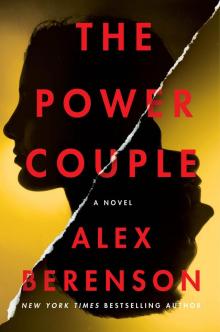 The Power Couple
The Power Couple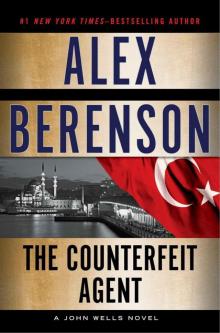 The Counterfeit Agent
The Counterfeit Agent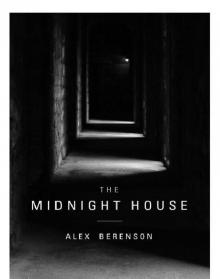 The Midnight House
The Midnight House The Prisoner
The Prisoner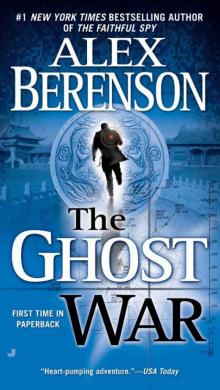 The Ghost War
The Ghost War The Shadow Patrol jw-6
The Shadow Patrol jw-6 The Shadow Patrol
The Shadow Patrol The Deceivers
The Deceivers The Night Ranger jw-7
The Night Ranger jw-7 The Faithful Spy
The Faithful Spy The Prince of Beers (Kindle Single)
The Prince of Beers (Kindle Single)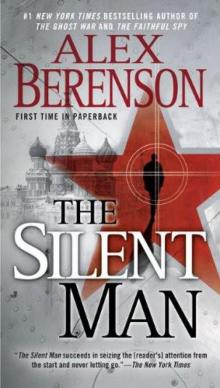 The Silent Man jw-3
The Silent Man jw-3 The Silent Man
The Silent Man The Wolves
The Wolves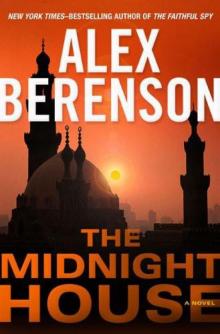 The Midnight House jw-4
The Midnight House jw-4 The Ghost Agent
The Ghost Agent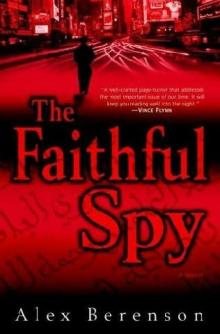 The Faithful Spy jw-1
The Faithful Spy jw-1 The Prince of Beers
The Prince of Beers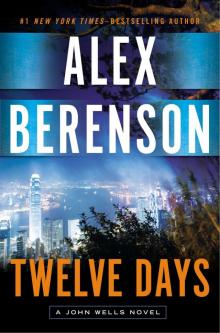 Twelve Days
Twelve Days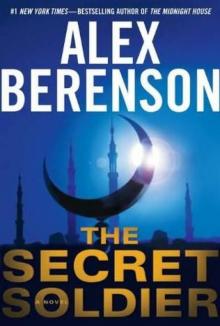 The Secret Soldier jw-5
The Secret Soldier jw-5 The Ghost War jw-2
The Ghost War jw-2 The Night Ranger
The Night Ranger